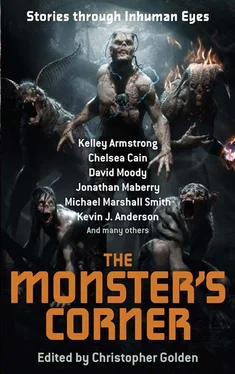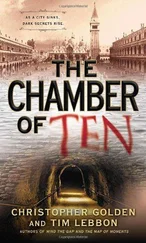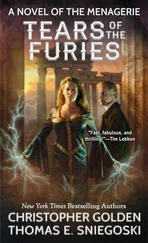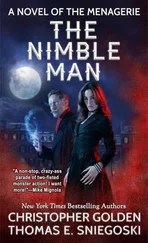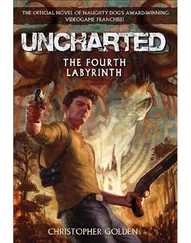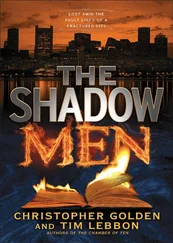Saint John said nothing, and his smile did not waiver.
Rose finally told him where the gang lived and where they “played.” Saint John nodded. To Peter he said, “Stay here. Stay silent. Stay hidden.”
“You can’t tell me what to do.”
“No. I can only tell you how to stay alive.”
Peter scowled. “You’re gonna get killed. You’re gonna leave us like the nuns did and the driver did.”
Saint John could feel the weight of the knives hidden in his clothes. He said, “Doubt me now, Peter. Believe me when I return.”
And he left.
7.
THERE WERE SIXTEEN MEN at the hotel that had been converted into a lair for rabid dogs. Sixteen men on three floors.
Saint John drew his knives and went in among them.
Sixteen men were not enough.
The skinny junkie was one of them. He was on the third floor, sleeping in a bed with a woman who was handcuffed to the metal bed frame. Her skin was covered with cigarette burns. Saint John revealed great secrets to the little junkie. And to the others. For some of them it was very fast — a blur of silver and then red surprise. For a few it was a fight, and there were two Saint John might have admired under other circumstances. But not here and not now.
Saint John painted the walls with them. He opened doorways for them and sent them through into new experiences. He took the longest with the two men who were in the room with Tommy. They were the last ones he found. So sad for them that circumstance gave Saint John time to share so many of his secrets. The boy was unconscious throughout, and that was good; though Saint John wished that Peter could have been here to serve as witness. That child, of all of them, would probably understand and appreciate the purity of it all.
Saint John left the adult captives with keys and weapons and an open door. He set a fire in the flesh of the dead men and on the beds where the women and this body had been. As he walked away the building ignited into a towering mass of yellow flames.
Saint John carried Tommy in his arms. Halfway to the church the child’s eyes opened. He beat at the saint with feeble fists.
“N — no …” the boy whimpered.
“No,” agreed Saint John. “And never again.”
The boy realized that he was wrapped in a clean blanket, and when he looked into Saint John’s eyes he began to cry. He tried to speak but could manage no further words. In truth there was no lexicon of such experiences that was fit for human tongues. Saint John knew that from those days with his own father and those vile, grunting men. The look the saint shared with the boy was eloquent enough.
Saint John bent and whispered to him. “It was a dream, Tommy, but that dream is over. Peter and your other friends are waiting.”
When he reached the square where the cathedral sat, Saint John saw that the fire on the roof had failed to take hold. The tiles smoldered, but the church would not burn. Not tonight.
The fire of the burning hotel lit the night, and as he walked, Saint John could see the other cherubs — the angels — and the dusty Rose standing in the doorway of the church, surrounded by the arch of caved saints, and every face was turned toward him.
Peter broke from the others and ran down the steps and across the street. He was crying, but he still held his knife, and he held it well. With power and love. Saint John approved of both.
Rose came, too; wobbling and unsteady, but with passion. Her face glowed with a strange light, and she reached out to take Tommy from Saint John. Her brow was wrinkled with confusion.
“Why?” she demanded.
There was no way to explain it to her. Not now. She would understand in time, or she would not.
Rose turned, shaking her head, and carried Tommy toward the church as the other angels flocked around her.
It left Saint John and Peter standing in the middle of the street. They watched the others until they vanished into the shadows, then turned and watched the glow of fire in the sky. Finally they turned to face each other. Peter slowly held out the knife, handle first, toward Saint John.
Saint John was covered with blood from head to toes. He had a few bruises and cuts on his face and hands. He sank down into a squat and studied the boy.
“No,” he said, pushing the offered knife back. “It looks good in your hand.”
The boy nodded. “You didn’t answer the lady,” he said. “She asked you why you went and got Tommy.”
“No,” Saint John agreed. “Do you need me to explain it to you?”
Peter looked down at the knife and at the blood on Saint John’s face, and then met his eyes. The moment stretched around them as embers fell from the sky. In the distance there were screams and the rattle of automatic gunfire.
“No,” said Peter. Saint John knew that this boy might even have tried to get Tommy back himself. He would have died, of course, and they both knew it. Peter was still too young. But he would have tried very well, in ways the men in that building would not have expected. The boy would not have died alone.
Saint John nodded his unspoken approval.
They smiled at each other. Together they crossed the street and mounted the stairs and stood on the top step, watching the city die. There were fires in a dozen places.
“It’s pretty,” said Peter.
“It’s beautiful,” said Saint John.
The boy considered. He nodded.
The golden embers floated down around them.
THE GIRLS SLIP IN AT NIGHT. I see the ravages in the morning, the bald patches in the tansy, the yarrow mowed in swaths. Vervain and pennyroyal, feverfew and sage, ginger, lemon balm, parsley. A tincture or tisane of any of these, and the white bellies of the girls stay smooth, scrubbed from inside out. It is true: Secretly I planned my gardens for these girls. After the Ministers seized the country and remade it in God’s name, I could be hanged in the gibbets for my garden; I could be laser-flayed for the powers of my plants. But the girls only talk between themselves, and steal, and in any case they are too quick for me. They watch my house for movement, or listen for the slide and drag of my bad leg. When I know they are there, I stand and clump over to the door as quietly as I can. But in the sudden crack of light that falls into the garden, a girl is always leaping, a white doe, over my stone fence.
Tonight, I hear another one out in the darkness. I pause the movie I am watching and move silently through the house and onto the warm lawn. I can come close enough to catch this girl’s arm: She is either stupid or her ears are too stuffed with panic to hear. She spins under my grip and I see her broad, triangular face turned to dumpling in terror, the pillowcase in her hands stuffed with rue.
I know this girl. She is the long-legged one who breathes her wet breath onto her desk. Then she makes a brush of her red hair and paints the moisture into designs that fade as she draws them. The boys find this behavior mysterious. I find it gross. Her essais in my class are trite beyond belief, not to mention ungrammatical.
I know why you’re here, I say.
She blinks and her eyes fill with tears. Two waning moons are reflected in them. Don’t tell, she whispers. Don’t call the Ministers.
I shrug: I must, I say. It is illegal, what you are doing. You will go to prison and maybe die there. Or one of the work camps, if you are lucky.
Oh, she says. Madame. Please. I’ll do anything.
She looks me deep in the face, trying not to look away. Anything, she says, and reaches out a hand and makes an attempt at a caress. I watch her hand near my bicep and falter, then fade away. She can’t look at me.
Not that, I say, drily. But there is something.
Читать дальше
